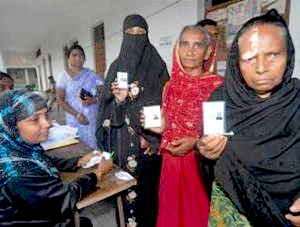Patna, Aug 21: Polling in the crucial bypolls for 10 Assembly seats in Bihar was peaceful today, but marked by low turnout, with average of 11.9 per voter turnout by 10 AM, state Election Commission (EC) said.
 Of the 10 seats, Parbatta constituency in Khagaria district recorded the highest turnout of 14 per cent while it was the lowest in Bhagalpur with just 8 per cent polling.
Of the 10 seats, Parbatta constituency in Khagaria district recorded the highest turnout of 14 per cent while it was the lowest in Bhagalpur with just 8 per cent polling.
The EC arranged for boats in the flood-affected areas Mohiuddinagar and Parbatta constituencies to ferry voters to the polling stations. Boats were also used to move polling personnel and security forces to their destinations.
Old and young voters were seen walking to the polling booths located in different constituencies, but there was a marked lack of enthusiasm among them.
The by-elections are being held at Hajipur, Chapra, Mohiuddinagar, Parbatta, Bhagalpur, Rajnagar (SC), Jale, Mohania (SC), Narkatiaganj and Banka.
A total of 94 candidates including 5 women are in the fray on the 10 seats. Hajipur has the maximum 15 contestants while Banka and Rajnagar (SC) have just 6 candidates each.
Altogether 26.42 lakh voters spread over 2,422 polling stations will get an opportunity to decide their fate today.
The polling, which started at 7 AM will continue till 6 PM for all the constituencies except Hajipur, Parbatta and Banka, where it will end at 4 pm on security grounds as these are considered Left Wing Extremism (LWE) affected seats.





Comments
Add new comment